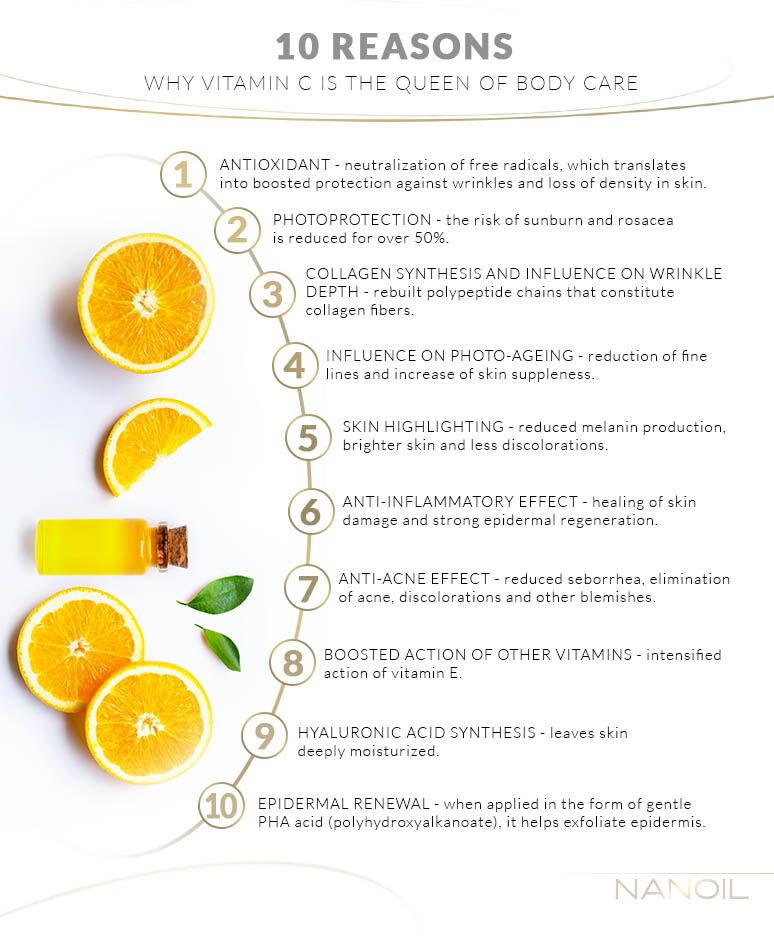- NANOIL Products
- Oils
- Face serums
- Hair masks
- Shampoos
- Hair conditioners
- Hair styling
- Care
- Hair Porosity Test
- Blog
- Contact

Vitamin C is the queen of body care. Irreplaceable, perfect and foolproof - it belongs to the VIP group of the finest rejuvenating and skin improving substances. Uninterruptedly, it’s one of the most effective 'vitamins of youth' of proven effectiveness. There is no other similar substance that could be considered as a viable alternative to vitamin C. Since the human body isn't able to produce vitamin C on its own, it has to be constantly supplied with it. Skin seems to carve for vitamin C the most, and the best form of delivering this essential nutrient to dermis is through applying a serum. Why? How does vitamin C affect skin? Continue reading and your approach to skin care will change dramatically.
One of the factors responsible for causing damage to epidermis and dermis - including its cells - is oxidative stress. Free radicals are the sworn enemies of your skin: not only do they modify the metabolic rate of cells but also damage lipid and protein structures. Consequently, skin ages faster, loses its suppleness and isn't strong enough to carry out self-regenerating processes effectively.
This is the vitamin C that neutralizes reactive form of oxides and nitrogen. As a result, it protects the cells against oxidative damage and aids in maintaining the adequate reduction–oxidation potential of cells. In plain English, the molecules of vitamin C are built in such a way to be able to seize a damaging unpaired electron and make it neutral for skin.
Furthermore, vitamin C also boosts other crucial skin processes, e.g. it stimulates the synthesis of ceramides that handle two tasks: they replenish skin with water and combat water loss. Therefore, when the level of ceramides in dermis is adequate, skin remains elastic and the ageing processes are significantly delayed.
It's worth realizing that vitamin C is the strongest antioxidant known to humans. It suits all skin types, including couperose because it’s able to fix capillaries and increase their elasticity. Not only does this vitamin accelerate wound healing processes but also it prevents swellings and bruises. This essential nutrient positively influences micro circulation and reduces skin redness.
What's incredible about vitamin C is its ability to highlight discolorations better than any other substance - it slows down melanin production. The vitamin has a gently exfoliating effect therefore it encourages the processes responsible for regenerating new tissues, is anti-inflammatory and bactericidal, aids in curing acne.
By impeding the adverse effects of some skin enzymes - which are responsible for breaking down collagen, elastin and hyaluronic acid - vitamin C in good at preventing wrinkles. This 'queen of youth' is also recognized as one of the best natural sunscreens that protects skin against UV rays. Owing to this, vitamin C is able to shield dermis against the cancerogenic effects of the sun.

Highlighted, smoothed out and radiant skin, perfectly moisturized, with no traces of discolorations, pigmentation or blemishes. Cured acne with no post-acne marks, improved collagen synthesis (which level decreases with age), full protection against the sunlight.
Undoubtedly, one of the most beneficial effects offered by vitamin C is the anti-ageing action. However, associating vitamin C with rejuvenating action only appears to be slightly hurtful. The truth is, the broad spectrum of applications makes vitamin C the most important conditioning agent. Beauty products containing vitamin C are perfectly suitable for:
Vitamin C also makes a good complement to improve the appearance of face skin due to natural beauty oils (e.g. argan, sweet almond or jojoba oil). The molecules of vitamin C get along with the 'oily' molecules of EFAs. When combined with natural beauty oil, vitamin C wins the ability to penetrate skin in its unchanged form deeper. To conclude, vitamin C and beauty oil make a perfect match that provides all skin types with the care their require.
The pure version of vitamin C (l-ascorbic acid) is unstable: it's vulnerable to sunlight and temperature, oxidises fast and loses its properties, which makes it able to affect epidermal layer only. Still, even in such a fragile form, vitamin C is found essential and precious - it's used to achieve so-called 'flash effect', which is instant skin brightening. L-ascorbic acid also serves its purpose when used in sunscreens.
The derivatives of vitamin C are commonly used in beauty products in order to take full advantage of its tremendous potential. The main derivatives of vitamin C are:
The most beneficial feature of vitamin C is its skin rejuvenating effect, which is owed to the above-mentioned ability to fight back free radicals. However, vitamin C has to be paired with a good carrier, such as serum, to help it penetrate deep and reach subcutaneous layer. The serum contains precious liposomes which are 'fatty spheres' that make the perfect carrier for unstable vitamin C. It’s worth realizing that a face serum focuses on conditioning deep skin layers whereas a regular face creams are supposed to work only superficially.
In order to make it easier for vitamin C to reach subcutaneous layer, there are special carriers used in cosmetics - liposomes - where active water-soluble substance is locked in. Their external layer is made of lipids that facilitate vitamin C transportation through epidermis.
Nowadays, owing to special carriers such as liposomes, nanosomes, nanodiscs, nanosponges, delivering vitamin C to the deepest skin layers becomes possible. Thanks to the just-mentioned carriers, the oxidation process of vitamin C is delayed for over a few days. This is a true revolution in skin care because this significantly improves the effectiveness of vitamin C: it helps store this essential nutrient in tissues and, in consequence, nourish skin better.
Liposomes are microscopic spheres. Their inside is filled with active water-soluble substance. The external coat of liposomes is made of lipids which help vitamin C reach subcutaneous layer. Therefore, these 'fatty spheres' make a perfect carrier for vitamin C molecules. Without them, neither would vitamin C be able to penetrate skin deeply on its own nor would it be able to remain in its unchanged form.
Comments: #0